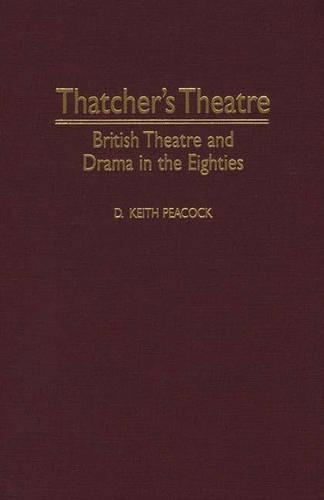
Thatcher's Theatre: British Theatre and Drama in the Eighties
(Hardback)
Publishing Details
Thatcher's Theatre: British Theatre and Drama in the Eighties
By (Author) D. Keith Peacock
Bloomsbury Publishing PLC
Praeger Publishers Inc
30th March 1999
United States
Classifications
Tertiary Education
Non Fiction
Theatre studies
Political economy
Public finance and taxation
792.094109048
Physical Properties
Hardback
248
Width 156mm, Height 235mm
567g
Description
The Thatcher administration of 1979 to 1990 had a profound and apparently lasting effect on British theatre and drama. It is now roughly a decade since the fall of Margaret Thatcher and, with the benefit of hindsight, it has become possible to disentangle fact from fantasy concerning her effect on the British theatre. During her administration, there was a significant cultural shift which affected drama in Britain. While some critics have argued that the theatre was simply affected by financial cutbacks in arts subsidies, this volume challenges that view. While it looks at the economic influence of Thatcher's policies, it also examines how her ideology shaped theatrical and dramatic discourse. It begins by defining "Thatcherism" and illustrating its cultural influence. It then examines the consequences of Thatcherite policies through the agency of the Arts Council of Great Britain. Having established this political and cultural environment, the book considers in detail the effect of Thatcher's administration on the subject-matter and dramatic and theatrical discourse of left-wing drama and on the subsidized political theatre companies which proliferated during the 1970s. Attention is then given to the development of "constituency theatres", such as Women's and Black Theatre, which assumed an oppositional cultural stance and, in some cases, attempted to develop characteristic theatrical and dramatic discourses. The penultimate chapter deals with the effect of Thatcherite economic policy and ideology on new writing and performance, while the final chapter draws conclusions and suggests that the cultural shift perpetrated by the Thatcher regime has altered the status of subsidized theatre from an agency of cultural, spiritual, social or psychological welfare to an entertainment industry which is viewed as largely irrelevant to the workings of society.
Reviews
Peacock's lucid new study is among the first to diagnose the cultural seachange in attitudes toward the arts and arts funding that took place in Britian during Margaret Thatcher's eleven-year term as Prime Minister as a matter of discourse. Writing a decade after Thatcher's fall from power, Peacock offers a comprehensive analysis of the long-term effects of grant reductions and market-based valuation of theatrical production that those writing in the thick of the battle could not-New England Theatre Journal
This sensible, authoritative book documents the debilitating effect Margaret Thatcher had on British theater during her tenure as prime minister in the 1980s.... Good notes, excellent bibliography. Highly recommended for all collections concerned with British drama and the larger question of theater and social context.-Choice
"This sensible, authoritative book documents the debilitating effect Margaret Thatcher had on British theater during her tenure as prime minister in the 1980s.... Good notes, excellent bibliography. Highly recommended for all collections concerned with British drama and the larger question of theater and social context."-Choice
"Peacock's lucid new study is among the first to diagnose the cultural seachange in attitudes toward the arts and arts funding that took place in Britian during Margaret Thatcher's eleven-year term as Prime Minister as a matter of discourse. Writing a decade after Thatcher's fall from power, Peacock offers a comprehensive analysis of the long-term effects of grant reductions and market-based valuation of theatrical production that those writing in the thick of the battle could not"-New England Theatre Journal
Author Bio
D. KEITH PEACOCK is Senior Lecturer in Drama at the University of Hull, where he specializes in modern British theatre. His articles have appeared in such journals as Modern Drama and Theatre Research International, and his books include Radical Stages (1991) and Harold Pinter and the New British Theatre (1997), both available from Greenwood Press.
